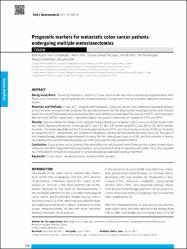| dc.contributor.author | Ustaalioğlu, Bala Başak Öven | |
| dc.contributor.author | Tilki, Metin | |
| dc.contributor.author | Kılıçoğlu, Zeynep Gamze | |
| dc.contributor.author | Bilici, Ahmet | |
| dc.contributor.author | Sürmelioğlu, Ali | |
| dc.contributor.author | Ustaalioğlu, Recep | |
| dc.contributor.author | Erkol, Burçak | |
| dc.date.accessioned | 10.07.201910:49:13 | |
| dc.date.accessioned | 2019-07-10T20:03:43Z | |
| dc.date.available | 10.07.201910:49:13 | |
| dc.date.available | 2019-07-10T20:03:43Z | |
| dc.date.issued | 2015 | en_US |
| dc.identifier.citation | Ustaalioğlu, B. B. Ö., Tilki, M., Kılıçoğlu, Z. G., Bilici, A., Sürmelioğlu, A., Ustaalioğlu, R. ve Erkol, B. (2015). Prognostic markers for metastatic colon cancer patients undergoing multiple metastasectomies. Turkish Journal of Gastroenterology, 26(5), 386-391. https://dx.doi.org/10.5152/tjg.2015.0169 | en_US |
| dc.identifier.issn | 1300-4948 | |
| dc.identifier.uri | https://dx.doi.org/10.5152/tjg.2015.0169 | |
| dc.identifier.uri | https://hdl.handle.net/20.500.12511/3930 | |
| dc.description | WOS: 000361693500005 | en_US |
| dc.description | PubMed ID: 26215062 | en_US |
| dc.description.abstract | Background/Aims: Following metastasis resection, 5-year survival rate has been reported as approximately 40%. There is no consensus regarding prognostic factors related to progression-free survival after repeated metastasectomies. Materials and Methods: A total of 21 patients with metastatic colorectal cancer who underwent repeated metastasectomies were retrospectively analyzed. The periods between the first and second metastasectomies and that between the second metastasectomy and progression were defined as metastasis-free survival 1 (MFS1) and metastasis-free survival 2 (MFS2), respectively. Univariate analysis was used to analyze factors related to MFS1 and MFS2. Results: Approximately two-thirds of the patients had synchronous metastasis, which were localized mostly in the liver (90%). During a 49-months follow-up, MFS1 was 15.7 (8.4- 23) months and MFS2 was 26.3 (12.3-40.4) months. Systemic chemotherapy followed the first metastasectomy (p=0.01), and the recurrence site (p=0.03) was found to be related to MFS1. Furthermore, the number of metastases during the first metastasectomy (p=0.02), the type of the chemotherapy regimen administered following the first metastasectomy (p=0.04), and the number of metastases before the second metastasectomy ( p=0.03) were significantly related to MFS2. Conclusion: Surgical resection is currently the most effective and curative form of therapy for colorectal metastasis, whenever possible. Repeated metastasectomies can be achieved safely in experienced centers; thus, the operability of the patients should be evaluated by a multidisciplinary approach during treatment. | en_US |
| dc.language.iso | eng | en_US |
| dc.publisher | Aves | en_US |
| dc.rights | info:eu-repo/semantics/openAccess | en_US |
| dc.subject | Colon Cancer | en_US |
| dc.subject | Metastasectomy | en_US |
| dc.subject | Metastasis-Free Survival | en_US |
| dc.title | Prognostic markers for metastatic colon cancer patients undergoing multiple metastasectomies | en_US |
| dc.type | article | en_US |
| dc.relation.ispartof | Turkish Journal of Gastroenterology | en_US |
| dc.department | İstanbul Medipol Üniversitesi, Tıp Fakültesi, Dahili Tıp Bilimleri Bölümü, İç Hastalıkları Ana Bilim Dalı | en_US |
| dc.authorid | 0000-0001-9717-4581 | en_US |
| dc.identifier.volume | 26 | en_US |
| dc.identifier.issue | 5 | en_US |
| dc.identifier.startpage | 386 | en_US |
| dc.identifier.endpage | 391 | en_US |
| dc.relation.publicationcategory | Makale - Uluslararası Hakemli Dergi - Kurum Öğretim Elemanı | en_US |
| dc.identifier.doi | 10.5152/tjg.2015.0169 | en_US |
| dc.identifier.wosquality | Q4 | en_US |
| dc.identifier.scopusquality | Q3 | en_US |


















